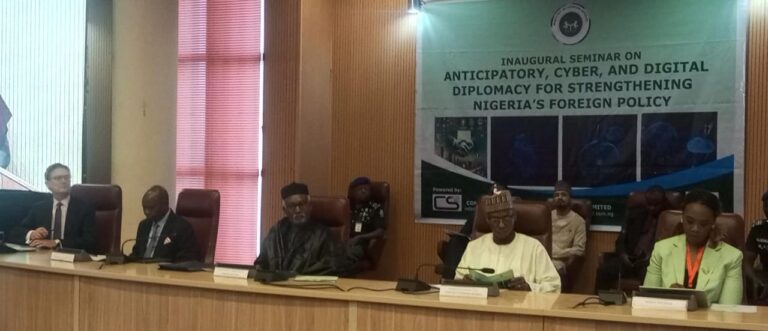By Peter Omopo
September 2, 2025
The Federal Government has called for the integration of cyber, anticipatory, and digital diplomacy into Nigeria’s foreign policy, stressing that the country must take a leadership role in shaping Africa’s digital future.
This was the central message at the inaugural seminar on “Anticipatory, Cyber, and Digital Diplomacy for Strengthening Nigeria’s Foreign Policy” held in Abuja on Tuesday, with government officials, diplomats, and international partners in attendance.
Minister of Foreign Affairs, Ambassador Yusuf Tuggar, said Nigeria cannot remain a passive observer in a rapidly evolving digital era.
“We are living through a historic transformation. Disruptive technologies, shifting geopolitical alignments, and deepening digital interdependence are redefining diplomacy. Nigeria must act with urgency to position itself as a principled, capable, and forward-looking actor in the evolving global digital order,” Tuggar stated.
He announced the creation of a Cyber Diplomacy Unit within the Ministry of Foreign Affairs to coordinate Nigeria’s cyber-related foreign policy and promote ethical digital governance. He also unveiled the Anticipatory Cyber and Digital Diplomacy Masterclass Series for African and Global South diplomats, which will be accessible online.
Tuggar further stressed that training cyber negotiators, strengthening regional response capabilities, and championing African-led solutions to global digital challenges were essential. He highlighted the importance of ethical AI development, climate-conscious data practices, and inclusivity of women, youth, and the private sector in Nigeria’s digital diplomacy strategy.
Attorney General of the Federation and Minister of Justice, Lateef Fagbemi (SAN), echoed these sentiments, saying the digital era requires a fundamental shift in statecraft.
“Traditional diplomatic methods are no longer sufficient. A robust legal and policy framework must be in place to deter cybercrime, protect digital sovereignty, and foster international cooperation,” Fagbemi said.
He added that ethical use of social media and digital platforms is crucial to Nigeria’s public diplomacy.
The British High Commissioner to Nigeria, Richard Montgomery, reaffirmed the UK’s support for Nigeria’s cyber diplomacy ambitions.
“We are proud to support today’s seminar. Under our Security and Defence Partnership, we are already collaborating on cybersecurity in areas such as threat hunting, digital forensics, and national incident response planning,” Montgomery noted.
He warned, however, that emerging technologies like artificial intelligence could “turbocharge” threats such as disinformation, hate speech, and cybercrime, making international collaboration even more urgent.
The seminar brought together diplomats, foreign policy experts, security agencies, legal practitioners, and private sector representatives. It underscored the global shift towards cyber diplomacy, as countries increasingly recognize the influence of technology companies, data governance, and artificial intelligence on international affairs.
Nigeria’s digital foreign policy has drawn global attention in recent years, particularly after the 2021 Twitter suspension sparked debates on digital sovereignty and platform accountability. By 2024, the country was facing over 4,000 cyberattacks daily, according to cybersecurity firm Nitroswitch.
With the launch of its cyber diplomacy strategy, the Federal Government said Nigeria is now determined to transform from a digital consumer to a digital leader in Africa and beyond.

